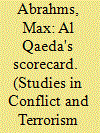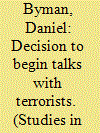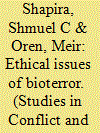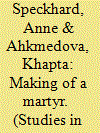| Srl | Item |
| 1 |
ID:
072125


|
|
|
|
|
| Publication |
2006.
|
| Summary/Abstract |
Terrorism scholars are divided over whether terrorism is an effective tactic. Disagreement derives from the fact that the objectives of terrorist groups are often highly contested. Nowhere is this clearer than in contemporary statements on Al Qaeda. This article explores the most common interpretations for why Al Qaeda attacked the United States on 11 September 2001, and then analyzes their empirical support. After determining the most compelling interpretation of Al Qaeda's objectives, the article evaluates Al Qaeda's success in achieving them since perpetrating this watershed attack. The following analysis provides a timely case study in the classic debate over whether terrorism is strategically rational behavior.
|
|
|
|
|
|
|
|
|
|
|
|
|
|
|
|
| 2 |
ID:
072121


|
|
|
|
|
| Publication |
2006.
|
| Summary/Abstract |
Governments have many means to begin a dialogue with terrorist groups. The offer of talks may lead terrorists' constituents to reduce their support for violence, and moderates within a group itself may also turn away from violence. Despite these potential benefits, even the consideration of entering discussions carries many risks. Talks with U.S. officials do indeed reward the use of terrorism, tangibly demonstrating that groups can kill innocents and yet become legitimate interlocutors-a reward that is costly both in terms of reducing the prevalence of this tactic worldwide and because it inevitably angers local allies fighting the groups. Moreover, talks often fail in a variety of ways, giving the terrorists a breathing space to rearm and organize and leaving the government looking foolish. Because talks often fail, policymakers should carefully explore whether the conditions are right for any hope of success before they begin a dialogue.
|
|
|
|
|
|
|
|
|
|
|
|
|
|
|
|
| 3 |
ID:
072120


|
|
|
|
|
| Publication |
2006.
|
| Summary/Abstract |
Bioterrorism has global implications, especially with regard to the use of contagious bio agents or "epidemic generators" with a high potential for causing epidemics. The grave medical implications of a bioterror attack are obvious, but some of the related ethical issues are often overlooked. Moral issues associated with the threat and with the attack may carry long-term consequences, which may shake the rudiments of democratic societies. Some of these efforts may be aided by regulations, laws, and enforcement. The best results will be achieved by a sense of responsibility and understandings of the public.
|
|
|
|
|
|
|
|
|
|
|
|
|
|
|
|
| 4 |
ID:
072123


|
|
|
|
|
| Publication |
2006.
|
| Summary/Abstract |
Beginning in June of 2000 Chechen terrorists have carried out twenty-eight acts of suicide terrorism acts including two mass hostage taking operations combined with suicide terrorism (Beslan and Nord Ost). This paper reports the findings from psychological autopsies (interviews with close family members and friends) of thirty-four (out of 112 total) of these human bombers as well as augmenting them with material from hostage interviews from Beslan and Nord-Ost. The authors analyze the phenomena on the levels of the organization, individual, society and in terms of ideology and compare findings from other arenas also involving suicide terrorism. The main findings are that a lethal mix occurs when individuals in Chechnya are vulnerable to self recruitment into suicide terrorism due to traumatic experiences and feeling a duty to revenge and this vulnerability is combined with exposure to groups that recruit and equip suicide terrorists with both an ideology and the means to explode themselves. The ideology supporting Chechen suicide terrorism is very similar to the global jihadist ideology but remains more nationalist in its goals. It functions for the bombers much like short lived psychological first aid-answering their posttraumatic concerns in a way that shortly leads to their deaths. Unlike the Palestinian case, there is little social support for suicide terrorism in Chechnya.
|
|
|
|
|
|
|
|
|
|
|
|
|
|
|
|
| 5 |
ID:
072124


|
|
|
|
|
| Publication |
2006.
|
| Summary/Abstract |
Selective targeting (or targeted killing) of terrorist leaders is a legitimate mode of operation and part of a state's counterterrorism, anticipatory, self-defense activities that are designed to prevent the continuation of terrorism. Paradoxically, this counterterrorism measure is the best way of preserving the military ethical conventions of "purity of arms." The concept refers to moral rules advocating the exercise of restraint and compassion in the course of a confrontation with the enemy. The "purity of arms" concept is debated extensively in democracies. Selective targeting of terrorist activists is a measure designed to hurt the real enemy while minimizing civilian casualties. Terrorist leaders and planners are targeted and an attempt is made, trying to avoid so far as possible, "collateral damage" that often accompanies any general military offensive. Customary international law permits targeting the enemy, provided that the criteria of necessity and proportionality of the attack are maintained. The relationship between the threat of terrorist attacks and the actual attacks carried out is shown in this study. The results contribute to reinforcing the legality of selective targeting as a preemptive mode of operation because they show that one should relate to a threat of an attack as to an imminent danger.
|
|
|
|
|
|
|
|
|
|
|
|
|
|
|
|
| 6 |
ID:
072122


|
|
|
|
|
| Publication |
2006.
|
| Summary/Abstract |
The United States is at significant risk of a future pyro-terrorist attack-when terrorists unleash the latent energy in the nation's forests to achieve the effect of a weapon of mass destruction-the threat, must be defined America's vulnerabilities understood, and action taken to mitigate this danger to the United States.
|
|
|
|
|
|
|
|
|
|
|
|
|
|
|
|